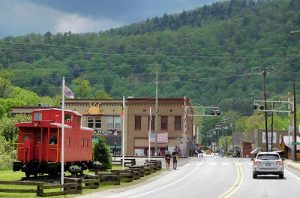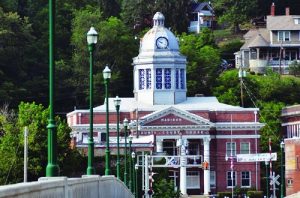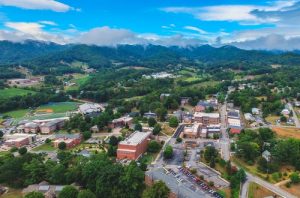Dorland-Bell School
After a lifetime of dedication as missionaries, Luke & Juliette Dorland retired to Hot Springs, lured by the advertisements of the healing natural springs. In his career, Luke had been a circuit rider pastor and also an educator who was commissioned to establish a mission school in Concord NC for Negro girls. He set a goal of making it on par with the finishing schools of the Northeast. On their arrival in Hot Springs in 1886 they bought a partially finished house just opposite the present Dorland Memorial Presbyterian Church. There were no schools in the town and because of the Dorlands’ reputation, the residents requested that they teach their children and soon the Dorlands were teaching 25 students in their home. With funds from Dorland’s former employer the Presbyterian Board of Home Missions, he expanded to eventually cover 6 ½ acres in town plus a 300-acre farm nearby.
That expansion was to continue for 45 years and eventually merge into what is today Warren Wilson College in Asheville. The reputation of the school spread and boarders came from West Virginia, Virginia, Tennessee, Kentucky, North Carolina and South Carolina and ranged in age from five to 28 from all levels of society. Dorland graduates had no trouble finding jobs after graduating because of the caliber of the teachers—many of whom were graduates of top schools in the Midwest and Northeast.
Boarders were girls only until 1897 because boys had to stay at boarding houses in town. In 1900 a true boys’ dormitory opened on a farm two miles away—called The Boys’ Home which came to be known as The Willows because of the large number of willow trees on the property.
Many of the buildings which were added dot the streets of current day Hot Springs as private residences. In 1895, the Dorlands built the core of what is now the Lance House and moved there. Dr. Dorland died in 1897.
Both boys and girls had work duties and classes included academic as well as practical skills. Other superintendents would follow after Luke Dorland’s retirement but one who was remembered for an innovative idea was his successor, Julia Phillips. She began a program called practice cottages—an idea which was used first here before any other Presbyterian USA School. Girls were to treat the cottage as a private home and were graded on their homemaking skills during that period of time. This program was made possible by a donation made by the wife of Cyrus McCormick (inventor of the reaper). At first six girls at a time lived for eight weeks in a separate building. Vine Cottage opened in 1910 and in 1911 McCormick Number 1 and in 1912 McCormick Number 2 both of which accommodated more girls. Frank Sherman Washburn Memorial Practice Cottage was built in 1924 and was the final building erected on the campus. The Washburn house is on the Hot Springs Walking Tour.
As public education became more common, the Home Mission began closing its mission day schools in Madison County. The Presbyterian Woman’s Board of Home Missions then decided in 1918 to consolidate Dorland Institute with the only other mission school in Madison County which had large boarding facilities, Bell Institute in Walnut. The name changed to Dorland-Bell School.
The last graduating class was in May 1942. Dorland-Bell closed and merged with the Asheville Farm School and a junior college would open on the Asheville Farm School Campus. The new institution was called Warren H. Wilson Vocational Junior College which eventually became Warren Wilson College.
The following year the real estate was sold to a group of Burnsville businessmen and subdivided and sold to private citizens. Some buildings were torn down. But, the cornerstone from the dormitory was saved and incorporated into the Dorland Memorial Presbyterian Church which is on the corner of Bridge Street and Meadow Lane.
Information about Dorland Bell was provided by Jacqueline Burgin Painter, a native of Hot Springs, who has written The Season of Dorland-Bell: History of an Appalachian Mission School, a wonderful recounting of the history of the school and a glimpse into the life in the small town of Hot Springs. Jacqueline Burgin Painter’s father Kenneth attended Dorland-Bell and later served as basketball coach for the school. She also organizes an annual reunion of the alumni of the school at the Dorland Memorial Presbyterian Church every August.



